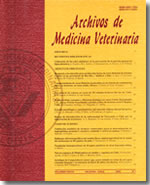Modulación de la respuesta inmune durante la infección por virus distemper canino: implicancias terapéuticas y en el desarrollo de vacunas
Main Article Content
Abstract
Canine distemper virus (CDV) infection is the main infectious cause of mortality in canines and exotic animals worldwide, and also threatens several endangered species such as the giant panda and big felids. The CDV blocks interferon and cytokines signaling pathways through massive infection of peripheral mononuclear cells and lymphocytes, which decreases B and T cell proliferation and causes CD4+ Th1 depletion. These events explain the severe and long lasting immunosuppression that characterizes CDV infection, which leads to a multisystemic disease with subsequent deleterious opportunistic infections. Complex events such as cell dysfunction caused directly by virus replication or exaggerated immune response triggered by infected cells, contribute to the establishment of diverse and complex neurologic diseases throughout the course of the disease. Considering that several species are affected and that CDV infection has a high morbidity and mortality, the present review highlights the relevance of designing safer vaccines, capable of both inducing strategic immunity and preventing CNS pathology. Additionally, in order to better understand the diverse and dynamic mechanisms involved in the disruption of the adaptive immune response, as well as immunity induction during viral infection and vaccination, this review addresses the role of dendritic cells (DC) during CDV infection. Furthermore, we will discuss how DC-based therapies could improve the outcome of these patients in terms of survival and prevention of associated sequels.

